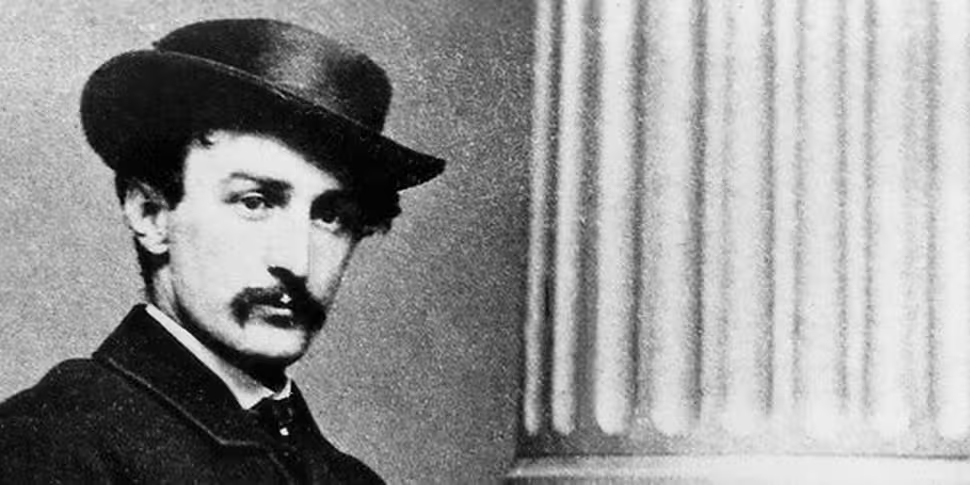On the 14th of April, 1865, a beloved actor made his way to Ford’s Theatre in Washington, and was ushered into the presidential box by an Irish immigrant. John Wilkes Booth took out his revolver and shot President Abraham Lincoln as he sat watching Our American Cousin. As dawn broke over Washington the next, less than a week after his leadership had helped secure the end of the brutal Civil War dividing the north and south of America, Abraham Lincoln became the first sitting president in US history to be assassinated.
John Wilkes Booth had committed the crime of the century, one he’d been planning for months, but which ultimately required a stroke of luck.
In the moments after his gun went off, as screams rang out across the theatre, Booth, always one for the dramatics, leapt from the presidential box to the stage, shouting “Sic semper tyrannis!” (“Thus ever to tyrants!”). Despite breaking a bone, Booth fled the building and would evade the authorities for a fortnight, along with his fellow conspirator David Herold, before being shot dead by a self-castrated milliner named Boston Corbett.
But who was John Wilkes Booth, and why would this actor, considered one of the greatest of his generation, reduce his career and name to just one act?

The wanted poster issued while Booth was on the run [Wikipedia Commons]
At one point in his career, Booth was known as the youngest star in the world, one of the most handsome, part of a beloved acting dynasty, and he would throw it all away after exploding onto the scene, Terry Alford, the writer of the new biography Fortune’s Fool, told Sean Moncrieff recently.
“He acted as an apprentice or stock actor in some of the theatres, and just came on as a star around the time that the American Civil War was starting,” Alford told Sean. “When Booth came on I would say he equalled the success of his old man. I would say he was more disciplined, he didn’t abuse drink as much, he was more mentally balanced. There were some challenges in the family that way, I would say.”
Growing up, Booth was constantly exposed to stress, threading the boards every evening, putting on a show for the audience, hoping they would like him. The life of a performer was physically and mentally draining, and took its toll on Booth, his father, and his brothers. Though, as Alford points out, his brothers never killed anybody, nor did they torture cats as children. And even when you might think you have Booth figured out as a nascent sociopath, he was impossible to typecast:The Booth family was notably apolitical, forever avoiding taking a political stance so as not to alienate any audience members with a dissenting view. But growing up in Maryland, a conservative state that still allowed slavery, probably helped politicise Booth, despite the fact his parents were not slave owners and he didn’t fit the bill of a rarefied southern gentleman. And Abraham Lincoln’s attempts to change that world sat uneasy with him.The stage, Alford reckons, helped define Booth’s political ideology and marry it with a justified sense of radicalism. Playing characters like Shakespeare’s Brutus, depicted as a hero for taking down the tyrannical Julius Cesar, could have fuelled that sense that taking action was not only necessary, but morally right. And it would offer him the role of a lifetime – the saviour of the American way.
And so, strange though it may sound, Booth spent half a year trying – and failing – to kidnap the president.Dogged and determined to act, where better than the theatre where Lincoln has applauded Booth’s performance to commit the crime. He let the president come to him, to a place where he was known, where he was comfortable, where he was loved. He could walk in, walk around, knowing every entrance and every exit. He knew exactly how to get into the President’s box, and how to get out of the theatre. And he used his background to realise his terrible success.

The box where Booth shot Lincoln in Ford's Theatre [Library of Congress]
Four other people were hanged for their part in the assassination, including the first woman ever to be executed by the US federal government, Mary Surratt. Three more people received life sentences, including Dr Samuel Mudd, a Maryland doctor who had attended to the break Booth suffered during his escape.
While three other presidents (William McKinley, James Garfield, and John F Kennedy) were killed by gunmen while in office, each of their killers would be captured within hours. But the 12 days that Booth limped as a fugitive across the District of Columbia, Maryland and Virginia gripped a stunned nation.
Ford’s Theatre shut up shop for more than a century in the aftermath, and today welcomes visitors to its museum about Abraham Lincoln and the assassination, while occasionally opening up his stage as a performance venue. Tourists can follow the trail of Booth’s escape on walking tours with quipping guides, including a sushi restaurant and karaoke bar that once belonged to Mary Surratt’s family.
In recent years, tourists flocking to John Wilkes Booth’s grave in Green Mount Cemetery in the Maryland city of Baltimore have taken to leaving pennies behind. The small copper coins are all left with face up, an army of Abes standing watch over his assassin.









